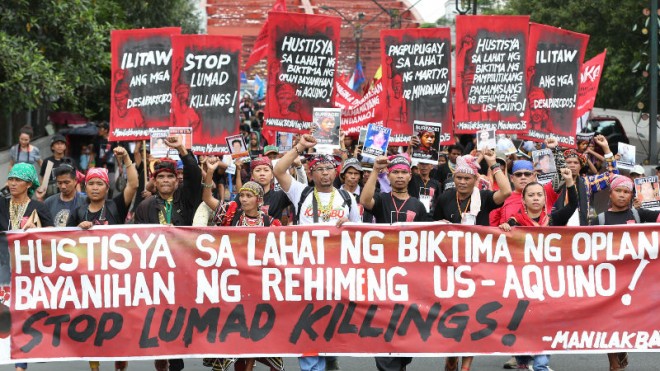‘Lumad’ yearn for day of return to ‘paradise’

‘LUMAD’ MARCH “Lumad,” indigenous peoples from Mindanao, march from the campus of the University of the Philippines in Diliman, Quezon City, to Liwasang Bonifacio in Manila to protest the killings and other human rights violations in their communities. The Commission on Human Rights says both the military and the New People’s Army were involved in extrajudicial killings of lumad. MARIANNE BERMUDEZ
WHEN can the “lumad” (indigenous peoples in Mindanao) return to “paradise” lost? Bai Josephine Palaga wants to know.
The 37-year-old leader from the Caraga region abhors Metro Manila, but she was forced to leave Mindanao to bring her people’s plea closer to the ears of government leaders, in hopes that someday they could peacefully return to the ancestral lands that they lost to violence and land grabbing.
“It’s our paradise there. It’s a kind of paradise where you don’t need money. We can plant our own food. We don’t need electricity and we don’t have to pay for air[con or electric fan]. We don’t have to deal with pollution and noise. It’s harmonious and peaceful. We don’t need money, we just want peace,” she said.
Palaga said she knew that it would take time before her people could safely go back. But this would not stop her from fighting for their rights.
“Sometimes, remembering our hardships makes me cry. This fight will take time but it will be worth it,” she said.
“Evacuation is our form of protest. We won’t be able to ask for help if we just stay there,” Palaga said. “Our fight is difficult but we are not losing hope.”
Joining Palaga in the fight were about 700 indigenous peoples (IPs) who have been camping out at Liwasang Bonifacio in Manila with her since Nov. 1 to protest the violence and injustices inflicted on their tribes.
On Monday, they left the campus of the University of the Philippines in Diliman, Quezon City, and marched to Liwasang Bonifacio.
Their presence at the park is like browsing over a Philippine history book in one go. The lumad are clad in tribal clothes and seeing them there is like seeing the images and words, printed on high school and elementary textbooks depicting the country’s various tribes, come to life.
Need to be respected
Tribal leader Aida Seisa from Davao City said she and her fellow IPs opted to wear tribal clothes to show the country that they were real, they exist, and they need to be respected.
“We don’t have money here but we get a lot of support,” Seisa said.
Their situation at Liwasang Bonifacio, however, is far from comfortable. There’s no water, kitchen and toilet. The lumad have to make do with portalets that are also dirty.
They sleep and sit on the ground that gets muddy when it rains or dusty when the sun is up. Worse, they share this piece of land with rats and roaches.
Their makeshift tents, made of bamboo stands and tarpaulin, were not enough to protect them from the erratic weather.
Despite this, the lumad are not leaving anytime soon. They said they would stay until their clamor to resolve human rights abuses allegedly perpetrated against them by the military have been addressed.
Palaga has been fleeing her ancestral home since she was 7 years old, and dreams of peacefully living there again someday.
She recounted how her father once roused family members from sleep and ordered them to evacuate to the nearest cave to avoid the military. They have been avoiding soldiers since.
“Why do we have to leave?” Palaga remembered asking her father. Her old man replied: “Mababangis ang military. (The soldiers are fierce.) ”
Thirty years after, Palaga is still asking questions. This time, she wants to know when they could return to “paradise.”
IBP task force
The Integrated Bar of the Philippines (IBP) said it would create a task force to look into the complaints raised by the lumad.
“My heart bleeds for all you,” IBP president Rosario Reyes said after hearing how the lumad were murdered in their provinces.
Reyes condemned the alleged trumped up charges filed against IPs who were resisting military control.
At the same time, the IBP head urged both the military and the New People’s Army (NPA) to “leave [the lumad] alone.”
Reyes said the IBP would also investigate claims that NPA rebels should be held accountable for the lumad’s displacement.
On Monday, the Commission on Human Rights said both the Armed Forces of the Philippines and the NPA were actively recruiting lumad for combat and were involved in extrajudicial killings of indigenous peoples in Mindanao.














